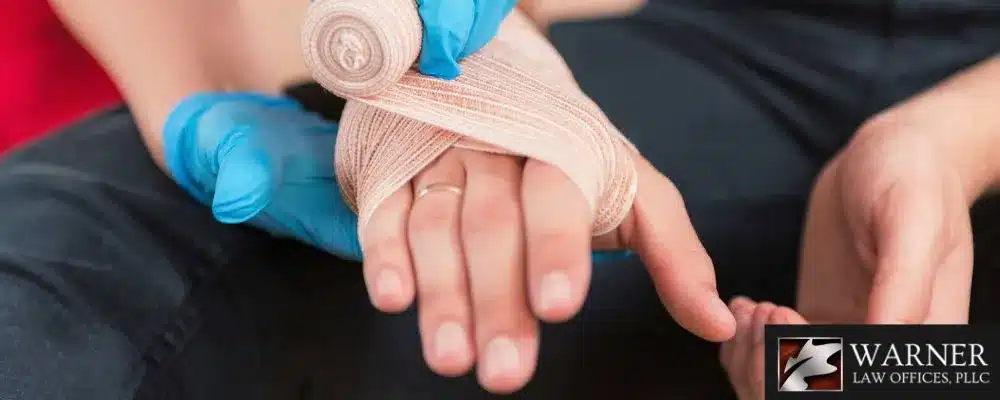
If you suffered a burn injury at work, you may face a long road to recovery. Medical and rehabilitation costs can be expensive, even without the possibility of lost wages.
There are two ways to get compensation for burns at work. One is through workers’ compensation insurance, which West Virginia requires nearly all employers to have. You don’t have to sue or prove you’re not at fault to get these benefits.
You can also sue for burn injuries at work in certain circumstances, including when someone other than your employer is at fault for the accident. At Warner Law Offices, PLLC, we’re here to help you understand your legal options after a workplace burn injury and fight for compensation on your behalf.
Table Of Contents
- Types of Workplace Burn Injuries: Can You Sue?
- What Are the Different Severity Levels of Burns?
- What Types of Evidence Is Necessary in a Burn Injury Case?
- What If My Burn Injury Was Partially My Fault?
- What If My Burn Injury Was Caused By Faulty Equipment?
- Can I Still if I’m Receiving Workers’ Compensation?
- What Compensation Can You Recover for a Burn Injury?
- How Much Time Do I Have to File a Burn Injury Lawsuit?
- Contact the Warner Law Offices to Review Your Burn Injury Case
Types of Workplace Burn Injuries: Can You Sue?
Your primary source of compensation for a workplace burn is workers’ compensation, which covers all workplace injuries. You can sue for workplace burn injuries caused by the carelessness of third parties or your employer’s deliberate intent.
Burn injuries are common in many workplaces. Depending on your industry and role, you may be susceptible to the following kinds of burn injuries:
- Thermal burns – Burns from open flames or hot surfaces, liquids, or These can also be caused by exposure to extremely cold temperatures.
- Electrical burns – Potentially severe internal and external injuries when high-voltage electricity flows through the body, common among electricians and utility workers.
- Radiation burns – Tissue damage following exposure to radioactive materials or processes, such as radioactive medical treatments).
- Chemical burns – Exposure to harsh chemicals, including strong cleaning agents, gasoline, and paint thinners. According to the National Center for Biotechnology Information, adults most often suffer chemical burns at work.
What Are the Different Severity Levels of Burns?
Severe burns require specialized medical attention. Tissue destruction may result in permanent disfigurement, loss of function, mobility issues, and recurring infections. Many burn victims also struggle with depression or traumatic flashbacks. Burns are often classified into three levels of severity:
- First-degree burns – Superficial burns that affect the top layer of skin. These burns cause redness and pain but rarely blister.
- Second-degree burns – Partial thickness burns that affect the upper and lower layers of skin. Second-degree burns may cause blistering and severe pain. Scarring is possible.
- Third-degree burns – Full-thickness burns that significantly affect multiple skin layers and may damage underlying tissue. Damage is severe, but there may be minimal to no pain due to nerve destruction.
Severe burns often result in higher medical costs, extended recovery times, and greater pain and suffering. It’s essential to consult with a physician after a burn accident. Some burns may seem minor initially but worsen due to a lack of care. For example, toxic chemicals can continue to damage tissue if not carefully cleaned.
What Types of Evidence Is Necessary in a Burn Injury Case?
If you were burned at work and decide to file a lawsuit, you will need as much evidence as possible. It’s important to begin collecting documentation quickly and preserve anything that might be relevant, including:
- Medical billing and treatment records
- Workplace accident reports
- Witness statements
- Photo and video evidence
- Employment records, including leave documentation
As the injury victim, your primary responsibility is to keep up with your medical care. Burns require close attention and specialized treatment. Attend all appointments and follow-ups. Continuing care is essential for burn healing, especially in severe cases.
Keep your medical records, including any out-of-pocket charges. You will need this information if you decide to sue for your work-related burn injuries.
What If My Burn Injury Was Partially My Fault?
Workers’ compensation is not fault-based and is available to you as an injured worker, even if you contributed to the cause of the accident. The skilled team at Warner Law Offices is here to help you with your claim and ensure your application is complete, accurate, and timely.
If you sue for burn injuries, you can receive compensation if you are less at fault than the defendants. However, because West Virginia is a modified comparative negligence state, the court will adjust your compensation based on your percentage of fault.
For example, suppose you suffer a chemical burn partially due to ineffective protective equipment and partially due to your failure to follow safety protocols. You sue, but the court determines you to be 30 percent at fault for $1 million in damages. In this case, you could collect $700,000.
To learn more about comparative fault in West Virginia, speak with our knowledgeable burn injury lawyer.
What If My Burn Injury Was Caused By Faulty Equipment?
When faulty equipment contributes to workplace burn injuries, several parties are potentially responsible, including the manufacturer, distributor, or maintenance provider. You may be eligible to file a lawsuit against all of these third parties. As with any legal action, you will need evidence that the equipment caused your injury. Our lawyers can help you understand your options and gather evidence.
Can I Still if I'm Receiving Workers' Compensation?
An injured employee receiving workers’ compensation is generally ineligible to sue the employer involved. However, depending on the circumstances of the case, you may be able to file a lawsuit against a liable third party. Parties possibly involved in burn injuries at work may include:
- Equipment manufacturers
- Chemical manufacturers
- Property owners
- Contractors and subcontractors
- Maintenance companies
- Utility companies
- Training or safety consultants
Third-party liability can be particularly difficult to prove. Consult with our experienced workplace burn injury attorneys to discuss the details of your case.
What Compensation Can You Recover for a Burn Injury?
Your first source of compensation after a workplace burn injury will typically be workers’ compensation. In West Virginia, workers’ compensation claims pay for medical bills and up to two-thirds of your average weekly wage at the time of injury.
If you are also eligible to sue a liable third party, your compensation may vary depending on the injury’s severity and impact on your daily life. For example, severe chemical burn settlements may be larger than settlements for more minor injuries.
Some impacts of a burn injury are economic and easily reduce to a dollar value. Others are noneconomic, meaning they do not have a set monetary value. When determining how much you may be eligible to claim, your lawyer will consider a variety of factors, including:
- Medical expenses
- Lost wages
- Disfigurement and scarring
- Pain and suffering
- Seriousness of the defendant’s misconduct
Every case is unique, and an individualized evaluation is the only way to calculate available damages. Consult our compassionate legal team about your case to understand how much you could recover.
How Much Time Do I Have to File a Burn Injury Lawsuit?
The deadline for filing a lawsuit depends on the statute of limitations, which varies by state and type of legal action. The West Virginia workers’ compensation statute of limitations is normally only six months after the accident. The West Virginia personal injury statute of limitations also gives you two years to file a lawsuit.
These deadlines can pass quickly—if you miss them, you will lose your right to compensation. Speak with our workplace burn injury attorneys as soon as possible to understand and protect your legal rights and options.
Contact the Warner Law Offices to Review Your Burn Injury Case
When seeking compensation for burn injuries at work, you need an experienced legal professional on your side. The legal team at Warner Law Offices is committed to fighting for your rights. In 2024, we received the Top 10 Personal Injury Attorney designation from Best of the Best Attorneys.
Known for our aggressive advocacy against powerful companies, we are a small firm that secures big results. Motivated by a strong sense of justice and fair play, we have won high-value case results of up to $13 million for our clients.
Let us help you pursue full and fair compensation for your burn injuries. Call (304) 345-6789 or contact us online for a free consultation. You pay nothing unless we win your case.



